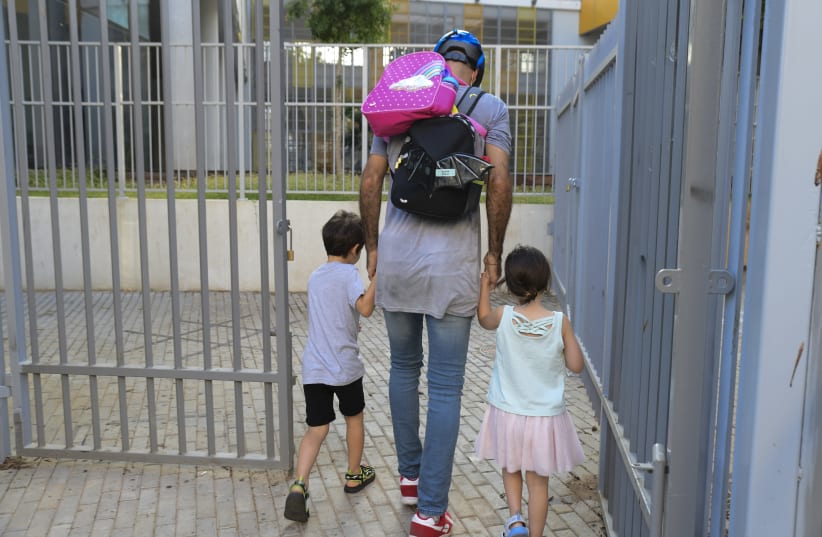Our children feel the effects of pandemic whiplash, too. School is open, then school is closed. Home confinement for months on end, then it’s “out-to-the-park-you-go.” Everyone’s wearing face coverings, then not everyone’s wearing face coverings. Normal life of what they remember pre-2020 is replaced by abnormal life that the adults refer to as the “new normal.. From masks to lockdowns, it’s like a magic trick gone bad: Now you see ‘em, now you don’t!
How do we help our children make sense of all this, navigate what is reasonable to expect around the next twisting bend? First and foremost, we need to keep talking. At the beginning, parents went into great detail explaining the unusual new vocabulary terms being hurled at their children’s little ears: “quarantine,” “pandemic,” “unprecedented times.” People planned activities for long hours in lockdown, reviewed proper mask-wearing with their children, and found safe ways for them to socialize via technology or social distancing.
But the enthusiasm wilted as time went by, as did our energy for making creative inroads in this new normal and updating our children on the rapidly changing pandemic landscape. The problem is that if anything, our children’s questions have only grown. I know my children’s have.
“How come I still need to wear a mask if so many other children aren’t?” “What does it mean that this disease has new variants?” “Why are some people getting the vaccine while others aren’t?” “Why does this community building say ‘masks required’ and yet people aren’t wearing them?” Which leads to the inevitable bombshell inquiry: “What’s with all the people breaking rules? Isn’t rule-following sacred in Judaism?”
We need to confront the uncomfortable questions with candor, keep re-explaining the current situation as we go along, and not leave our children to just pick up the info by osmosis or assumption. We need to keep the dialogue going and the expectations fluid.
When my new book, Light at the Beginning of the Tunnel: Wiring our Children for Happiness, was released a few months ago, I thought the timing was perfect for helping families get through this difficult time because of the material the book contains about grit, resilience, emotional agility and vulnerability. But I now realize that the material on expectation management and dialogues with our children ranks potentially even higher.
AFTER ALL, “expect the unexpected” seems to be the tagline of 2020\2021, and expectation management is often referred to as “the most underrated life skill.” Therefore, as our rabbinic sage Hillel famously reflected, “If not now, when?”
Expectations form a framework for making sense of the world, and learning to manage them can make major differences in how we experience success and happiness. The pandemic has forced us to change our expectations for everything from socializing, travel, simchas and the safety of everyday activities, to what we can expect from others in terms of responsibility, honesty and even adherence to law.
It’s clear that this year contained an ever-present danger that was at the root of suffering. But layered beyond that in our everyday life, was a deep web of topsy turvy-ness. As one of the wisest experts on human behavior I know reflected to me recently, “One of the main reasons people go off the handle, is when they were expecting A, but B happens instead.” No wonder many of us have felt shaken to the core over and over again this year. After all, we can control no one and nothing but ourselves (and those wily expectations that can otherwise lead to feeling a deep sense of “unfairness”).
From my own experiences and research, I’ve seen it’s helpful to regularly check in with ourselves (and guide our children through the process), to evaluate how our expectations are playing into feelings of frustration or unhappiness both in terms of personal expectations, and expectations others are projecting onto us. Especially nowadays, a lot of expectations have to do with situational context, personal tools and worldview.
As a tale from our own expectation management, last summer we planned our eldest’s bar mitzvah, a life-cycle event we dreamed about for years. My husband and I joked, “We are organizing three bar mitzvahs!” as we meticulously planned several different variations on how to jerry-rig the simcha to most closely resemble our original pre-pandemic vision depending on restrictions.
It turns out that only when we threw away all expectations, did we truly enjoy the final product: an extremely scaled back, limited attendee, mismatched-lawn-chair-adorned backyard siyum (completion celebration for a unit of Torah study) that focused fully on the accomplishment itself. Our son diligently spent five years finishing all six tractates of the Mishnah for God’s sake, so why had we cared so much about details like the menu only months before?
This summer, as we plan our next family life-cycle event, this time a bat mitzvah. We are planning ONE event with a very different vision, namely a fluid one. And one of the topics we are studying with the bat mitzvah girl herself along with the Torah ones? That underrated life skill of managing expectations.
The writer is the author of Light at the Beginning of the Tunnel: Wiring our Children for Happiness, which empowers Jewish families with micro-habits, mindsets and lifelong skills to navigate these challenging times.
